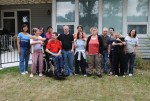Residents and staff from three of Shalom Residences’ homes in front of the home on Enniskillen Avenue. (photo by Kelsey Halldorson)
A few months ago, Shalom Residences was given the green light from Manitoba Family Services to add a new home in Winnipeg’s South End.
With the vision that people with intellectual disabilities should be full members of the community and that the community is responsible for ensuring that social, residential, religious and cultural opportunities exist to make this possible, a group of parents and other community volunteers founded Shalom Residences as a nonprofit organization in 1978. The first Shalom Residences home opened in 1980.
“Since 1980, Shalom Residences has added five more homes, expanding to provide service to 28 people (22 of whom live in six community residences/group living in single family homes),” said Nancy Hughes, the organization’s executive director since 1991. “These homes have two to five people living together, with staff working in shifts.
“The other six people we serve are in our Supported Independent Living (SIL) program. They each rent their own apartments and have staff support for 10 to 28 hours per week (for budgeting, shopping, meal planning and preparation, housekeeping, etc).”
Currently, all community residences and apartments are located in Winnipeg’s West Kildonan and Garden City areas.
“We’ve always gone about expansion in a careful, gradual way, and future planning includes a home for younger adults in the South End of the city,” said Hughes. “There is a very real need for this within the Jewish and general communities. We’re continuing to lobby our major funder, the [provincial government], to assist us to develop this resource.”
The organization also receives a grant from the Jewish Foundation of Manitoba to hire a part-time Jewish identity coordinator.
Shalom Residences provides Judaic-oriented programs, which includes developing community awareness and increased community acceptance of people with intellectual disabilities as full and equal citizens.
“Although we foster a Jewish milieu, our admission policies are non-sectarian,” noted Hughes. The organization’s ultimate objective is to enable those in its programs to achieve their potential as community members and to become as self-sufficient as possible.
“The people we support have a wide range of abilities and needs, so we offer a higher level of assistance in the community residences and a more independent arrangement in SIL,” said Hughes.
“For the first time, we’re looking in the South End of the city, [and] we have three young people who’ll be funded for this new home,” she said about the residence funding that was recently approved.
The search for a house will take place in River Heights and Crescentwood, and it possibly will include the neighborhoods of Lindenwoods and Charleswood. Once the house is selected, Shalom Residences will buy and renovate it for wheelchair accessibility.
The government will provide ongoing funding for staffing, food and shelter, but Shalom Residences needs to cover the down payment for the house and the initial furnishings. “We could certainly use donations towards some of the costs,” said Hughes.
According to Hughes, this is the first time the government has offered funding for young adults. “We’re very happy to be able to help people leave their family home and start an adult life of their own at a younger age,” she said.
One of the young adults for whom the funding was granted is Micah, one of a pair of twins born with disabilities on the autism spectrum. Micah’s mother, Karla Berbrayer, said, “He has a visual impairment as well as mild cerebral palsy. There is some developmental delay. Although Micah can do his times tables up to the 20 times level, and count to 500 in Hebrew, French and Spanish, he has challenges with daily living skills. My husband and I long ago accepted the fact that Micah cannot be left unattended in the home, and will always require a caregiver.”
The family has been planning for a home for Micah – and has been working with Hughes – for some 10 years, including petitioning the government for the funding, with the stipulation that Micah live in a Jewish setting in the South End with two other individuals close to his age. In their view, Shalom Residences was the only option.
“My husband and I keep a kosher home and observe all the Jewish holidays,” said Berbrayer. “The Jewish religion is a very important aspect of our lives, and we have raised all our children to value their Jewish identity.”
Berbrayer’s husband joined Shalom Residences’ board 20 years ago. He eventually became president and has remained active within the organization.
“We had begun to accept the concept that a new home in the South End for Micah may never happen,” said Berbrayer. “As recently as this fall, I said to my husband, ‘I don’t know that this will ever happen.’”
In November, the couple received the news that the funding for Micah had been approved and that a house would be opened in the South End for him and the two other individuals with whom they asked for him to be housed.
“I burst into tears when the news came,” said Berbrayer. “It was such an unbelievable accomplishment. I felt that I didn’t care how long it would take for the move to transpire, because now I knew that it would happen.”
She expressed gratitude to the government for the decision, and called the new home “a huge step for the organization,” noting that it had been a long time since a new residence had been opened, and that none has been located in the city’s South End.
There is a fundraising dinner for Shalom Residences planned for June. To purchase tickets, for more information or to volunteer, visit shalomresidences.com, email [email protected] or call 1-204-582-7064.
Rebeca Kuropatwa is a freelance writer living in Winnipeg.

